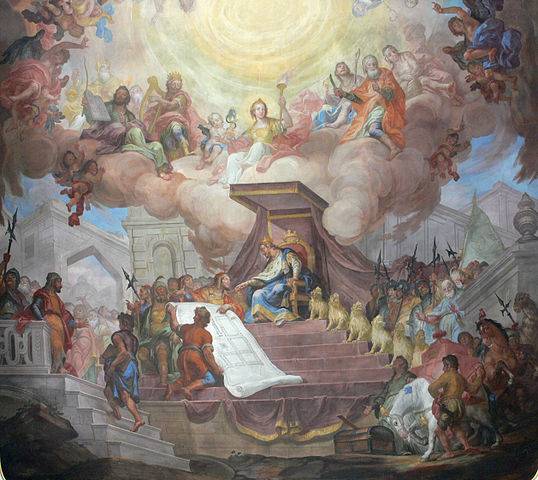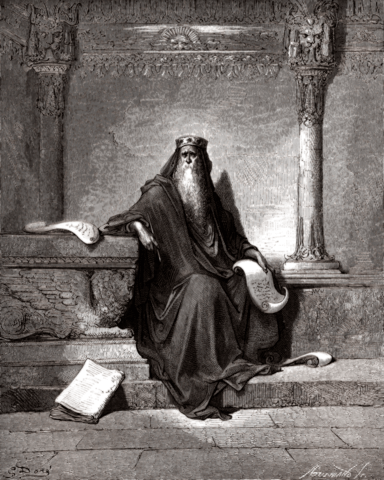Maya comes from the Sanskrit meaning ‘that which is not’ and therefore is ‘illusion’. Different sages and schools of thought have emphasized the illusion of maya in different ways. They commonly warn that the material or physical can mislead our soul and thus entangle and entrap it into bondage. Our soul aspires to control and enjoy matter. However, in so doing we end up serving lust, greed, and anger. Often we then redouble our efforts and, compounding mistake upon mistake, fall deeper into illusion or maya. Thus maya can act like a whirlpool which, with growing strength, entraps one more and more, leading to despair. Maya results in accepting that which is temporary as having lasting value. It looks for enduring happiness in this world, which this world cannot provide.
The Hebrew Bible contains wisdom literature that explores this illusion, or vanity. The author of this wisdom poetry was Solomon, son of King David. He records how he experienced Maya and its effects as he lived ‘under the sun’. That is, living as though only the material has value. Looking for enduring happiness only in this physical world under the path of the sun.
Solomon’s experience of Maya ‘under the sun’
In the book of Ecclesiastes, Solomon described all that he did to find satisfaction in life. He wrote:
1 I said to myself, “Come now, I will test you with pleasure to find out what is good.” But that also proved to be meaningless. 2 “Laughter,” I said, “is madness. And what does pleasure accomplish?” 3 I tried cheering myself with wine, and embracing folly—my mind still guiding me with wisdom. I wanted to see what was good for people to do under the heavens during the few days of their lives.
4 I undertook great projects: I built houses for myself and planted vineyards. 5 I made gardens and parks and planted all kinds of fruit trees in them. 6 I made reservoirs to water groves of flourishing trees. 7 I bought male and female slaves and had other slaves who were born in my house. I also owned more herds and flocks than anyone in Jerusalem before me. 8 I amassed silver and gold for myself, and the treasure of kings and provinces. I acquired male and female singers, and a harem as well—the delights of a man’s heart. 9 I became greater by far than anyone in Jerusalem before me. In all this my wisdom stayed with me.
10 I denied myself nothing my eyes desired;
Ecclesiastes 2:1-10
I refused my heart no pleasure.
My heart took delight in all my labor,
and this was the reward for all my toil.
Riches, fame, knowledge, projects, women, pleasure, kingdom, career, wine… Solomon had it all. And more of it than anyone else of his day or ours. The smarts of an Einstein, the riches of a Jack Ma, the social/sexual life of a Bollywood Star, along with a royal pedigree like that of Prince William in the British Royal family. All rolled into one. Who could beat that combination? You would think he, of all people, would have been satisfied.
In another of his poems, Song of Songs, also in the Bible, he records his erotic, red-hot love affair. The very pursuit that seems most likely to provide life-long satisfaction. This poem, almost 3000 years old, has the romantic intensity of the best of the Bollywood love films.

Andreas Brugger, Public domain, via Wikimedia Commons
The Bible records that with his immense power and wealth he obtained 700 mistresses! That is much more than the most prolific lovers of Bollywood or Hollywood will ever have. But even with all that love, all the riches, all the fame and the wisdom – he concluded:
1 The words of the Teacher, son of David, king in Jerusalem:
2 “Meaningless! Meaningless!”
says the Teacher.
“Utterly meaningless!
Everything is meaningless.”3 What do people gain from all their labors
at which they toil under the sun?
4 Generations come and generations go,
but the earth remains forever.
5 The sun rises and the sun sets,
and hurries back to where it rises.
6 The wind blows to the south
and turns to the north;
round and round it goes,
ever returning on its course.
7 All streams flow into the sea,
yet the sea is never full.
To the place the streams come from,
there they return again.
8 All things are wearisome,
more than one can say.
The eye never has enough of seeing,
nor the ear its fill of hearing.
9 What has been will be again,
what has been done will be done again;
there is nothing new under the sun.
10 Is there anything of which one can say,
“Look! This is something new”?
It was here already, long ago;
it was here before our time.
11 No one remembers the former generations,
and even those yet to come
will not be remembered
by those who follow them.12 I, the Teacher, was king over Israel in Jerusalem. 13 I applied my mind to study and to explore by wisdom all that is done under the heavens. What a heavy burden God has laid on mankind! 14 I have seen all the things that are done under the sun; all of them are meaningless, a chasing after the wind.
Ecclesiastes 1:1-14
11 Yet when I surveyed all that my hands had done
and what I had toiled to achieve,
everything was meaningless, a chasing after the wind;
nothing was gained under the sun.12 Then I turned my thoughts to consider wisdom,
and also madness and folly.
What more can the king’s successor do
than what has already been done?
13 I saw that wisdom is better than folly,
just as light is better than darkness.
14 The wise have eyes in their heads,
while the fool walks in the darkness;
but I came to realize
that the same fate overtakes them both.15 Then I said to myself,
“The fate of the fool will overtake me also.
What then do I gain by being wise?”
I said to myself,
“This too is meaningless.”
16 For the wise, like the fool, will not be long remembered;
the days have already come when both have been forgotten.
Like the fool, the wise too must die!17 So I hated life, because the work that is done under the sun was grievous to me. All of it is meaningless, a chasing after the wind. 18 I hated all the things I had toiled for under the sun, because I must leave them to the one who comes after me. 19 And who knows whether that person will be wise or foolish? Yet they will have control over all the fruit of my toil into which I have poured my effort and skill under the sun. This too is meaningless. 20 So my heart began to despair over all my toilsome labor under the sun. 21 For a person may labor with wisdom, knowledge and skill, and then they must leave all they own to another who has not toiled for it. This too is meaningless and a great misfortune. 22 What do people get for all the toil and anxious striving with which they labor under the sun? 23 All their days their work is grief and pain; even at night their minds do not rest. This too is meaningless.
Ecclesiastes 2:11-23
The promise of pleasure, wealth, work, progress, romantic love to ultimately satisfy was shown by him to be an illusion. But today this is the same message that you and I still hear as the sure road to satisfaction. Solomon’s poetry has already told us that he had not been able to find satisfaction in these ways.
Solomon continued his poetry to reflect on death as well as life:
19 For the lot of mortals and the lot of beasts is the same lot: The one dies as well as the other. Both have the same life breath. Human beings have no advantage over beasts, but all is vanity. 20 Both go to the same place; both were made from the dust, and to the dust they both return. 21 Who knows if the life breath of mortals goes upward and the life breath of beasts goes earthward?
Ecclesiastes 3:19-21
2 All share a common destiny—the righteous and the wicked, the good and the bad,[a] the clean and the unclean, those who offer sacrifices and those who do not.
As it is with the good,
so with the sinful;
as it is with those who take oaths,
so with those who are afraid to take them.3 This is the evil in everything that happens under the sun: The same destiny overtakes all. The hearts of people, moreover, are full of evil and there is madness in their hearts while they live, and afterward they join the dead. 4 Anyone who is among the living has hope—even a live dog is better off than a dead lion!
5 For the living know that they will die,
Ecclesiastes 9:2-5
but the dead know nothing;
they have no further reward,
and even their name is forgotten.
Why would the Bible, a Holy book, contain poems about the pursuit of wealth and love? We do not associate these with with Holiness. Most of us expect Holy Books to discuss ascetism, duhka and moral precepts to live by. And why does Solomon in the Bible write about death in such a final and pessimistic way?
The path Solomon took, so commonly pursued today, was to live for self, creating whatever meaning, pleasure or ideals that he chose to pursue. But that end was not good for Solomon – the satisfaction was temporary and illusion. He experienced Maya. His poems are in the Bible like a big warning sign – “Do not take this Path – it will disappoint!”. Since we are tempted to go down the same path that Solomon took we are wise to heed him.
The Gospel – Answering Solomon

Yitzilitt, CC BY-SA 4.0, via Wikimedia Commons
Jesus Christ is probably the most well-known person in the Bible. He also made statements about life. In fact he said:
“… I have come that they may have life and have it to the full”
John 10:10
28 “Come to me, all you who labor and are burdened, and I will give you rest. 29 Take my yoke upon you and learn from me, for I am meek and humble of heart; and you will find rest for yourselves. 30 For my yoke is easy, and my burden light.”
Matthew 11:28-30
When Jesus says this he answers the futility and hopelessness Solomon experienced. Maybe, just maybe, here is an answer to the dead-end of Solomon’s path. After all, gospel literally means ‘good news’. Is the Gospel really good news? To answer that we need an informed understanding of the Gospel. Also we need to examine the claims of the Gospel. We need to think critically about the Gospel, without just being a mindless critic.
As I share in my story, this was a journey that I took. The articles in this website are here so you too can begin to explore. The incarnation of Jesus is a good place to start.